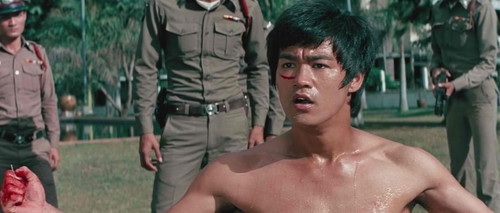For this post, I will focus on the 36th Chamber of Shaolin (1978), the Big Boss (1971), and the Drunken Master (1978).
The 36th Chamber of Shaolin is a Shaw Brothers' film, directed by Liu Chia-Liang and starring Gordon Liu. Following the revenge story of a student who becomes a monk, it is a very masculine film, focusing heavily on shirtless, muscular men with a lack of female roles. That is not to say that this film is bad in any way, shape, or form, but simply a note about the characters present in the film. Since some of the film did take place on the Shaw Brothers' studio lot(?), I did notice some recurring places, the teahouse/shop in particular, from previous films such as One-Armed Swordsman, but they did a much better job of capturing a more "natural" feel than its predecessor in terms of lighting and setting up props in those areas.
I especially enjoyed the use of the training montage that showcased the titular character's transformation into a monk over a span of six years, as it followed the development from a run-of-the-mill student into one of the strongest monks at the Shaolin temple. Since this also showed the blood, sweat, and tears being put into this period of time, it also made me as a viewer more sympathetic and impressed at the character's transformation into a seemingly unstoppable force of nature. I do feel as though the losing battles between the monastery's Justice Officer was the most exciting part of the film, which was a shame since it was placed in the center of the plot since no one was as strong as him afterwards.Though the final battle was a bit... lackluster, in my opinion, in comparison to the happenings at the Shaolin temple, it was still a somewhat fitting end for the film.
The Big Boss, a Golden Harvest film, directed by Lo Wei. Probably the most exciting martial arts film I've seen to date, it felt more realistic than any of the films before it, probably due to the case that Bruce Lee and Han Ying-Chieh were actual practitioners of martial arts, and it definitely showed through the fight sequences showcasing their abilities, choreography, and varied cinematic shots. However, the thing that probably stuck the most out to me was the leitmotif(?) for the charm that Cheng Chao-An (Bruce Lee) held, using it as a sort of reminder to not fight. Whenever it would appear, an unnaturally uplifting and happy theme would play, instantly destroying any of the tension that may have been established in that scene previously. Though it only appeared a few times through the first half of the film, it seemed to break the immersion that the film had earlier.
I also was not sure how to feel about the portrayal of Chiao Mei (Maria Yi) in the story. It was a bit uncomfortable to watch at times knowing that they were cousins, but moreover, the fact that Chiao Mei was simply a damsel in distress and nothing more than a plot device was quite disappointing, to say the least. I hoped that she would have a larger role, but alas, she did not in the end.
Finally, we end with the Drunken Master, a very comedic martial arts film starring Jackie Chan. Probably out of all the films for far, this was the most enjoyable one yet. Perhaps it was due to Jackie Chan's unique fighting style, taking advantage of whatever is in the environment around him, or perhaps it was the almost nonsensical and generally whimsical plot (with serious elements mixed in at the right parts), while always maintaining interesting fights and training montages. From an overconfident boy to an... overconfident boy with a drinking problem, it was an interesting and hilarious character arc to watch, while still retaining the fidelity to the underlying serious plot. I am glad that Jackie Chan managed to develop himself as a comedic performer, since I really cannot see him in many other roles unlike this.



No comments:
Post a Comment